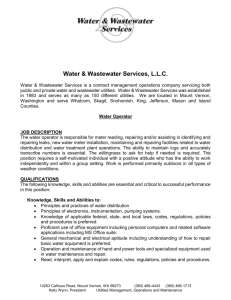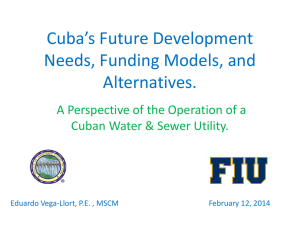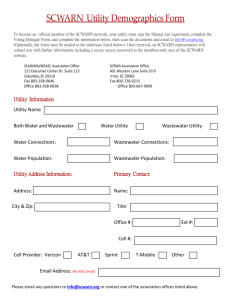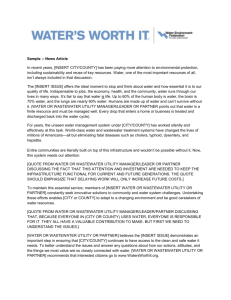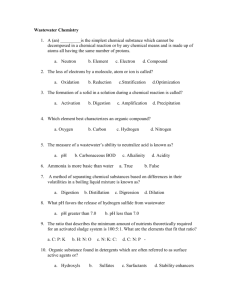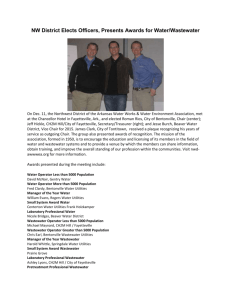nl_2003-10
advertisement
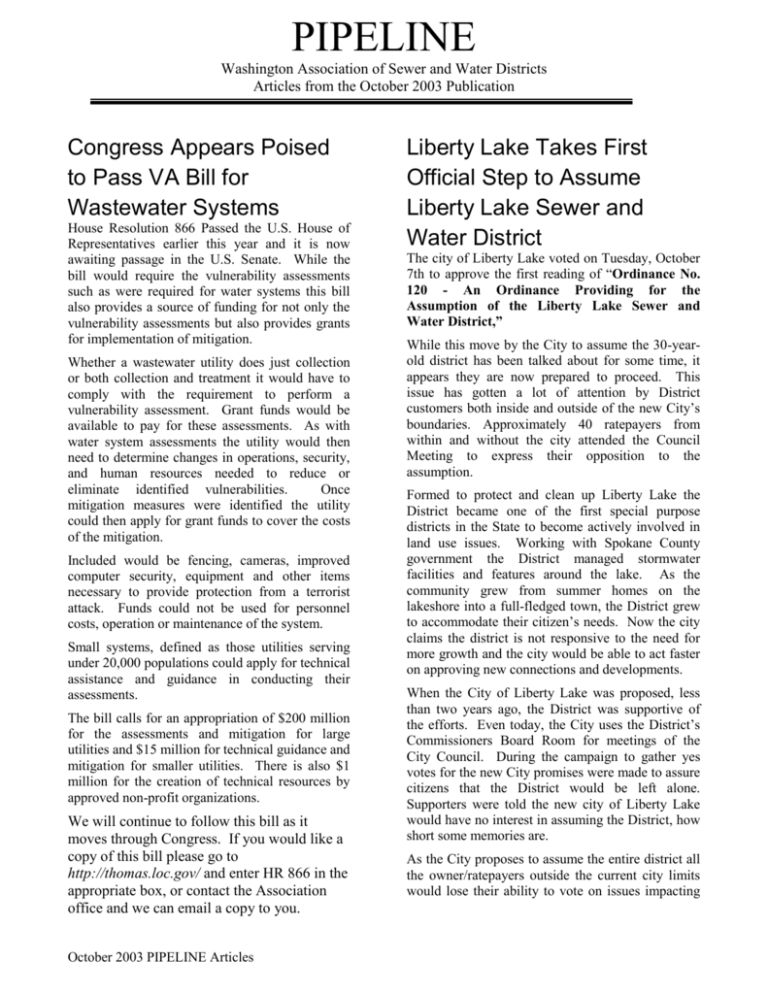
PIPELINE Washington Association of Sewer and Water Districts Articles from the October 2003 Publication Congress Appears Poised to Pass VA Bill for Wastewater Systems House Resolution 866 Passed the U.S. House of Representatives earlier this year and it is now awaiting passage in the U.S. Senate. While the bill would require the vulnerability assessments such as were required for water systems this bill also provides a source of funding for not only the vulnerability assessments but also provides grants for implementation of mitigation. Whether a wastewater utility does just collection or both collection and treatment it would have to comply with the requirement to perform a vulnerability assessment. Grant funds would be available to pay for these assessments. As with water system assessments the utility would then need to determine changes in operations, security, and human resources needed to reduce or eliminate identified vulnerabilities. Once mitigation measures were identified the utility could then apply for grant funds to cover the costs of the mitigation. Included would be fencing, cameras, improved computer security, equipment and other items necessary to provide protection from a terrorist attack. Funds could not be used for personnel costs, operation or maintenance of the system. Small systems, defined as those utilities serving under 20,000 populations could apply for technical assistance and guidance in conducting their assessments. The bill calls for an appropriation of $200 million for the assessments and mitigation for large utilities and $15 million for technical guidance and mitigation for smaller utilities. There is also $1 million for the creation of technical resources by approved non-profit organizations. We will continue to follow this bill as it moves through Congress. If you would like a copy of this bill please go to http://thomas.loc.gov/ and enter HR 866 in the appropriate box, or contact the Association office and we can email a copy to you. October 2003 PIPELINE Articles Liberty Lake Takes First Official Step to Assume Liberty Lake Sewer and Water District The city of Liberty Lake voted on Tuesday, October 7th to approve the first reading of “Ordinance No. 120 - An Ordinance Providing for the Assumption of the Liberty Lake Sewer and Water District,” While this move by the City to assume the 30-yearold district has been talked about for some time, it appears they are now prepared to proceed. This issue has gotten a lot of attention by District customers both inside and outside of the new City’s boundaries. Approximately 40 ratepayers from within and without the city attended the Council Meeting to express their opposition to the assumption. Formed to protect and clean up Liberty Lake the District became one of the first special purpose districts in the State to become actively involved in land use issues. Working with Spokane County government the District managed stormwater facilities and features around the lake. As the community grew from summer homes on the lakeshore into a full-fledged town, the District grew to accommodate their citizen’s needs. Now the city claims the district is not responsive to the need for more growth and the city would be able to act faster on approving new connections and developments. When the City of Liberty Lake was proposed, less than two years ago, the District was supportive of the efforts. Even today, the City uses the District’s Commissioners Board Room for meetings of the City Council. During the campaign to gather yes votes for the new City promises were made to assure citizens that the District would be left alone. Supporters were told the new city of Liberty Lake would have no interest in assuming the District, how short some memories are. As the City proposes to assume the entire district all the owner/ratepayers outside the current city limits would lose their ability to vote on issues impacting PIPELINE Washington Association of Sewer and Water Districts Articles from the October 2003 Publication their utility and those elected officials who set their rates and service. The next step will be for the Council to pass the 2nd reading of the Ordinance for the full assumption process to begin. Over the last several months the Association has met with the Cities Association in an attempt to find some manner to address assumption agreeable to both sides. Association of Washington Cities representatives made it very clear that they would consider running a bill requiring a vote on assumption unacceptable. NWWARN: a new tool for water/wastewater utilities The creation of an all-hazard Northwest Region emergency alert network is advancing rapidly. Initial funding by the U.S. Department of Homeland Security will provide the Pacific NW with a regional, multi-sector system all hazard alert network. The purpose of this system is to connect all sectors of government and business in one efficient alert network that can be activated either locally, regionally or nationally. Fire, law enforcement, emergency management agencies, critical infrastructure (including water/wastewater), key businesses and military will receive simultaneous alerts of developing emergencies, both natural or man made, short notice warnings of terrorist activities, or information regarding events having broad or significant impact. The first responder community found, following 9-11, that they did not have broad area, multisector information dissemination capacity. The first network of this type was created by the Dallas area FBI office right after 9-11. The new Department of Homeland Security learned of this alert system and has authorized the creation of 4 prototype systems in other parts of the U.S. These prototype networks are being set up in Atlanta, Indiana, North Texas and Seattle. For water/wastewater utilities this will be a nocost communications network that will allow a utility to alert neighboring utilities of emergency situations, request mutual aid, or seek information on how to respond to an emergency. It will also October 2003 PIPELINE Articles provide rapid communications between utilities and law enforcement, public health, state agencies, and other critical infrastructures. NWWarn will, in addition, allow utility management a direct link to terrorist and natural emergency information coming from the Federal Government. To participate in this no-cost alert network requires submitting a subscription form, available on-line, to the NWWarn governing committee. Each subscriber will be reviewed by people working in that sector to vouch that the subscribing agency and agency contacts are who they say they are and should be provided access to the information available on the network. The peer review group or “gatekeepers” will be individuals representing special districts, PUDs, and city owned water/wastewater systems. If you would like to be considered for a water gatekeeper please contact the Association. NWWarn will also be available for the general public to use to provide information on suspicious activities they witness to law enforcement and other applicable sectors. For water/wastewater it is a tool that can be used by ratepayers to communicate emergency information to your utility. More information will be made available as the network begins operation. If you have questions please feel free to call Hal Schlomann at (206) 246-1299 or 1(800) 244-0124. NWWarn-Water Sector Organizes Representatives of several water utilities representing special districts, PUDs and cities met at the Association’s offices on October 7th to begin planning administration of the NWWarn Water/Wastewater Sector. Issues discussed included how to meld this new system with existing systems, using NWWarn to build a regional emergency response team, how to get other utilities involved, mutual aid with agencies other than water/wastewater and a host of other issues. The committee hopes to begin PIPELINE Washington Association of Sewer and Water Districts Articles from the October 2003 Publication regular meetings to build on the idea of utilities helping utilities in times of emergency. Education: a key purpose of your Association Most members are aware of the two annual conferences held each Spring and Fall. Workshops on a wide range of topics are featured at each event. For several years now we have also held concurrent workshops, which allows for water or sewer specific topics and issues to be discussed. Two years ago the Education and Conference committees were merged into a single Leadership Development Committee which has responsibility for all Association education activities. A prime benefit of this committee merger has been the ability to take short one-hour conference workshops that garner great interest and turn them into half and full day stand-alone workshops. Over the past year two financial workshops came from this new process. If you attended a conference workshop or a workshop at another organization’s conference that you believe would be of interest to other Association members we would like to know. Providing the Leadership Committee with the event name and date, the speaker, topic, and other information would allow us to locate that person and bring them to other WASWD members. The Leadership Committee is always seeking your ideas for workshop or conference topics. District Managers often have issues or developments impacting their district that would be of interest to other districts. Associate members are another great source of workshop ideas. It is they that are out working with emerging technologies and ideas that WASWD members would benefit from learning about. So please, share your ideas for topics, speakers, issues you would like to know about, problems that the collective members might have an issue with as well. By helping each other we all grow. October 2003 PIPELINE Articles State Auditor Reports Show Many Failures to Follow Proper Procedures for Federal Grants In reviewing the State Auditor’s reports for September, located on their web site, it was noted that several districts and cities failed to follow required procedures regarding their federal grants. In several cases the entity failed to request an audit from the State Auditor for the year in which the grant was expended. In another case the request for reimbursement was not made in accordance with the requirements of the grant agreement. In a majority of cases neither the contractors, the agency staff, nor other involved parties in the work fully understood the requirements contained in the grant or loan agreements. It can also be noted that while most of the agencies, which failed to follow the agreement completely, were small, some larger local government agencies made the same types of mistake. As more districts may have an opportunity to make use of federal grant or loan funds in the future they are urged to ensure they fully understand and follow the grant’s accompanying agreements. Standing Committees President Larry Jones is seeking good people to come forward to serve on the various standing committees of the Association. Member Commissioners, Managers, other District Staff and Associate Members are all welcome and needed on WASWD committees. These committees include: Audit, Bylaws, Finance, Government Relations, Leadership Development, Long Range Plan, Management Level Employees (Mutual Aid & Wage Survey sub committees), Personnel Committee, Public Relations, as well as the temporary Golf Committee. The committee year runs from January 1st to December 31st. So if you would like to help set the Association’s course for the next year please let us know which committee interests you.

